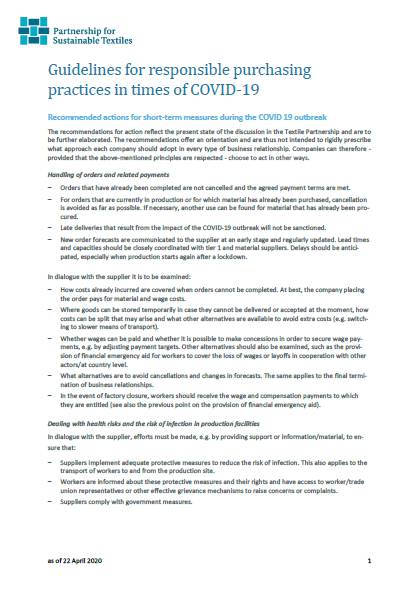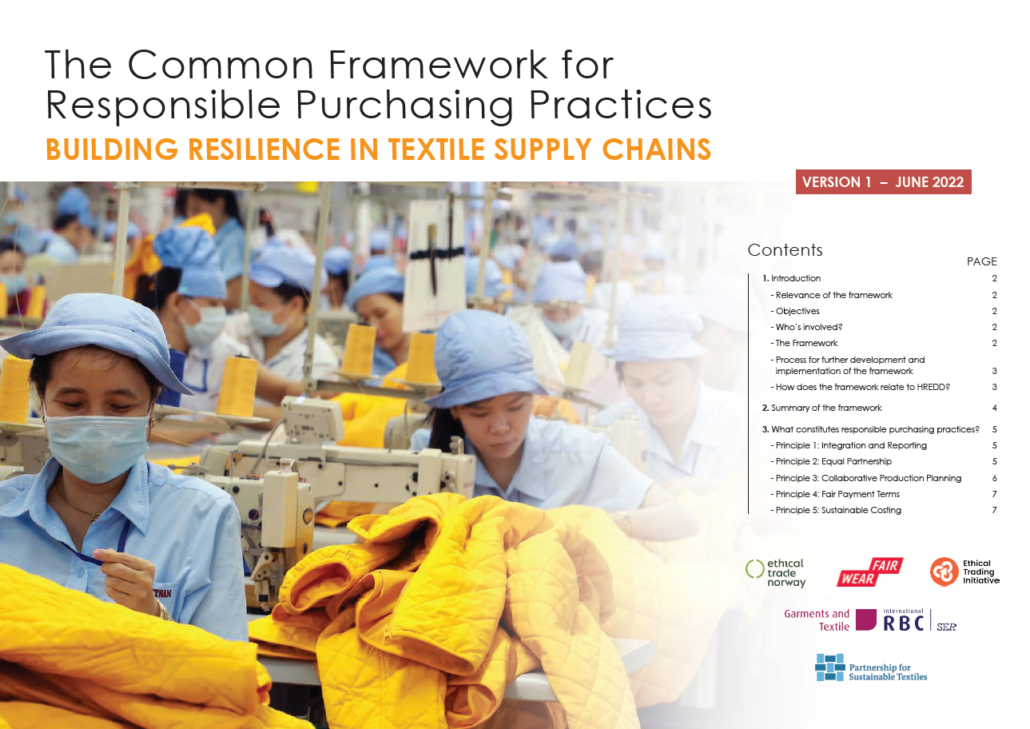Partnership Initiative on Living Wages
Because individual players have little impact on this issue, the Textiles Partnership has launched an Partnership Initiative on living wages. Here the participants of the initiative contribute actively to effective solutions in the wage question. The initiative currently consists of three modules that build on each other and are to be supplemented in the future by further modules.

With the Launch of the Living Wage Lab in September 2021, the Partnership Initiative Living Wages entered a new phase. The aim of the Living Wage Lab is to support PST members in developing and implementing individual living wage strategies and to develop scalable solutions together with their suppliers.
17 PST member companies as well as representatives of civil society and trade unions are participating in the Living Wage Lab. On the one hand, they want to exchange experiences on what they have already done to increase wages and what they plan to do in the future. On the other hand, they want to learn from each other how they can implement pilot projects to increase wages with suppliers and improve transparency and their purchasing practices.
In a Purchasing Practices Self-Assessment (PPSA), the participants in this module examine how their purchasing practices actually affect wages at their suppliers. Subsequently, they will develop individual improvement measures that increase suppliers' scope for wage increases. With training courses and peer learning formats, experts support the activities of the participants. These are ALDI Einkauf GmbH & Co. oHG (ALDI Nord), HOFER KG (ALDI SÜD), Deuter Sport GmbH, EDEKA ZENTRALE AG & Co. KG, HUGO BOSS AG, Hch. Kettelhack GmbH & Co. KG, Jako AG, KiK Textilien und Non-Food GmbH, ORTOVOX Sportartikel GmbH, Otto GmbH & Co KG (Otto Group), Textilkontor Walter Seidensticker GmbH & Co. KG, Triaz GmbH..
Central actors in the context of living wages are suppliers, since they directly employ workers and pay wages. However, suppliers often lack knowledge on how to calculate product prices in such a way that workers' wages are adequately taken into account. The additional module for the alliance initiative is therefore explicitly aimed at suppliers in production countries. The module aims to provide suppliers with a broad understanding of all labour costs incurred and to show how they structure prices to secure workers' wages. The trainings are conducted by the Fair Wear Foundation (FWF), the strategic cooperation partner of the Partnership, and are offered in cooperation with the Dutch Agreement on Sustainable Garments and Textile (AGT) in various textile producing countries.
In the country module, members want to work together in production countries for living wages ("Living Wages"). The first country module supports the Action Collaboration Transformation (ACT) initiative, which advocates the agreement of a regional collective agreement in the Cambodian textile industry. In this module, the participating companies will commit themselves to maintaining or increasing their sourcing volume in Cambodia at a constant level until 2022 and to take into account increased wage costs in the purchase prices. The activities are currently suspended, as the commitment is subject to the proviso that Cambodia retains its tariff concessions through the "Everything but Arms" (EBA) agreement. The EU is questioning this because it wants to obtain a consistent commitment from the government to respect civil rights.
With a new basic training, companies in the Textiles Partnership learn how their purchasing practices affect working conditions in the supply chain and how they can improve them. The 30-minute video introduces to the topic for all employees of departments involved in purchasing practices: CSR, purchase, design, HR, quality management, accounting. The video is available in German and English and was produced by the Partnership Secretariat with the support of Partnership member ALDI Süd. Further information
DEUTSCH
ENGLISCH
The "Common Framework for Responsible Purchasing Practices" serves as a uniform reference framework for responsible purchasing practices. Several multi-stakeholder initiatives have developed the document and hope that companies will pay more attention to the issue and initiate improvements.
The goal of the framework is to serve as a joint reference point for companies working to improve their purchasing practices and for multi-stakeholder initiatives (MSI) supporting their member companies in implementing practical improvements in purchasing, to increase the scope for improved working conditions in supply chains. The framework is the result of a 2-year process between a group of MSIs.
The global COVID 19 outbreak is taking on a scale that poses unprecedented challenges to brand and retail companies and far exceeds the scope of any single company. Nonetheless, the commitment of all Partnership members to respect human rights and pursue the Partnership's goals throughout the supply chain remains valid. The members of the Textile Partnership are working, both individually and together with other stakeholders, to mitigate the negative impacts of the COVID 19 outbreak on suppliers and workers in the garment supply chain and to secure stable business relationships for the future. The actions of the Partnership members are characterised by a cooperative approach and the understanding of a shared responsibility among all actors in the supply chain.
In order to mitigate negative impacts in the short term, the Textiles Partnership published a guideline containing recommendations for handling orders as well as health risks and the danger of infection in production facilities. These guidelines will be further developed to cover actions beyond the immediate time frame of the crisis situation.

@2023 Bündnis für nachhaltige Textilien



